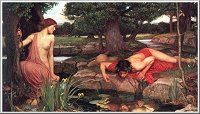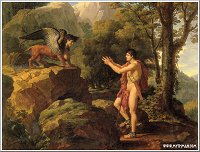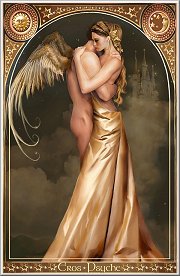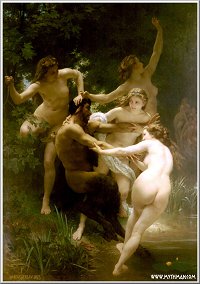
ECHO & NARCISSUS
CLICK TO ENLARGE

Oedipus & the Sphinx
by Francois Xavier Fabre
CLICK TO ENLARGE

PSYCHE AND EROS
CLICK TO ENLARGE

Nymphs & Satyr
by William Adolphe Bouguereau
CLICK TO ENLARGE
|
MEDICAL ALLUSIONS PAGE THREE
 Lethe (oblivion) was the daughter of Eris, goddess of
Discord, and she gave her name to the river of oblivion and
forgetfulness in the Underworld. Her name gives us the terms:
Lethe (oblivion) was the daughter of Eris, goddess of
Discord, and she gave her name to the river of oblivion and
forgetfulness in the Underworld. Her name gives us the terms:
 lethargy and
lethargic lethargy and
lethargic
 Mnemosyne was a Titaness, daughter
of Uranus and Gaia and the personification of Memory. We get a
number of words.
Mnemosyne was a Titaness, daughter
of Uranus and Gaia and the personification of Memory. We get a
number of words.
 Mnemonic,
Amnesia, amnestic, etc. are related terms. Mnemonic,
Amnesia, amnestic, etc. are related terms.
 Narcissus was a youth vainly proud of his
great beauty and quite indifferent to the feelings of those who
fell in love with him. A goddess cursed him to feel what it is
to love and get nothing in return. He subsequently fell in love
with his own image when he saw his reflection in the water of a
fountain, and believed that this image belonged to a spirit.
Every time he tried to embrace the image it disappeared and
appeared without saying a word. At the end the
desperate Narcissus died and was turned into a flower that still
bears his name.
Narcissus was a youth vainly proud of his
great beauty and quite indifferent to the feelings of those who
fell in love with him. A goddess cursed him to feel what it is
to love and get nothing in return. He subsequently fell in love
with his own image when he saw his reflection in the water of a
fountain, and believed that this image belonged to a spirit.
Every time he tried to embrace the image it disappeared and
appeared without saying a word. At the end the
desperate Narcissus died and was turned into a flower that still
bears his name.
 narcissism (extreme self-love based on an idealized self-image)
narcissism (extreme self-love based on an idealized self-image)
 Oedipus was the son of King Laius of
Thebes. The king ordered his newborn son Oedipus to be put to
death following an oracle's pronouncement that Oedipus would
grow up and kill him. Oedipus survived and years later met, had
an argument with and killed his father (without knowing his
identity). He then solved the riddle of the Sphinx and
unknowingly married his mother Jocasta. When he found out what
happened (and his mother killed herself) he put out his eyes.
His story has been told in Oedipus the King, Antigone,
and Oedipus in Colonus by Sophocles and Seven against
Thebes by Aeschylus.
Oedipus was the son of King Laius of
Thebes. The king ordered his newborn son Oedipus to be put to
death following an oracle's pronouncement that Oedipus would
grow up and kill him. Oedipus survived and years later met, had
an argument with and killed his father (without knowing his
identity). He then solved the riddle of the Sphinx and
unknowingly married his mother Jocasta. When he found out what
happened (and his mother killed herself) he put out his eyes.
His story has been told in Oedipus the King, Antigone,
and Oedipus in Colonus by Sophocles and Seven against
Thebes by Aeschylus.
 Sigmund
Freud named his famous Oedipus Complex after the mythological
character. Sigmund
Freud named his famous Oedipus Complex after the mythological
character.
 Phobos ('fear'
in Greek), from whose name the phobias derive, was another
illegitimate son of Aphrodite. Officially he was her son with
husband Hephaestus; however his real father was Ares the god of
war, whom Phobos used to accompany into battle. Phobos ('fear'
in Greek), from whose name the phobias derive, was another
illegitimate son of Aphrodite. Officially he was her son with
husband Hephaestus; however his real father was Ares the god of
war, whom Phobos used to accompany into battle.
 All the
Phobias (fear of something) are named after Phobos All the
Phobias (fear of something) are named after Phobos
 Priapus was the son of Aphrodite, goddess
of love, and Dionysus, the wine god. He was the god of
reproductive power and fertility and was later regarded as the chief deity of
lasciviousness and obscenity. Hera caused the baby to be ugly
and endowed with abnormally large genitals.
Priapus was the son of Aphrodite, goddess
of love, and Dionysus, the wine god. He was the god of
reproductive power and fertility and was later regarded as the chief deity of
lasciviousness and obscenity. Hera caused the baby to be ugly
and endowed with abnormally large genitals.
 Priapism
is the medical term for unusually large male genitals. Priapism
is the medical term for unusually large male genitals.
 Psyche was
a mortal girl with whom Eros (Cupid) fell in love with. Eros's
mother Aphrodite had forbidden him to see mortal girls. He
defied her order and started seeing Psyche in the dark, while
she was not allowed to ask his name or look at his face. When
she could no longer control her curiosity she disobeyed him and
lit a lamp to see her lover's face. Distraught that he had been
disobeyed, Eros fled away from Psyche. She then wandered long in
search of him, they were eventually united, got married and she
became immortal. Psyche was
a mortal girl with whom Eros (Cupid) fell in love with. Eros's
mother Aphrodite had forbidden him to see mortal girls. He
defied her order and started seeing Psyche in the dark, while
she was not allowed to ask his name or look at his face. When
she could no longer control her curiosity she disobeyed him and
lit a lamp to see her lover's face. Distraught that he had been
disobeyed, Eros fled away from Psyche. She then wandered long in
search of him, they were eventually united, got married and she
became immortal.
 psychiatry
(medicine of the soul), psychology, etc. psychiatry
(medicine of the soul), psychology, etc.
 Eros gave
his name to erogenous, eratomania, erotic, etc. Eros gave
his name to erogenous, eratomania, erotic, etc.
 Sappho was
a poetess who wrote lyrical poems about sex and love, probably
between women. She lived on the island of Lesbos (Mitilini)
which was named after the mythical Lesbos, who was the son of Lapithes. Sappho was
a poetess who wrote lyrical poems about sex and love, probably
between women. She lived on the island of Lesbos (Mitilini)
which was named after the mythical Lesbos, who was the son of Lapithes.
 From
Lesbos and Sappho are derived the modern words lesbian,
lesbianism, sapphism, etc. From
Lesbos and Sappho are derived the modern words lesbian,
lesbianism, sapphism, etc.
 Satyrs were half men (upper part) and
half goats (lower part) who were in the retinue of Dionysus, god
of wine. These party animals were infamous for their
lasciviousness and sexual appetite.
Satyrs were half men (upper part) and
half goats (lower part) who were in the retinue of Dionysus, god
of wine. These party animals were infamous for their
lasciviousness and sexual appetite.
 satyriasis (obsessive insatiable desire for sexual
gratification).
satyriasis (obsessive insatiable desire for sexual
gratification).
 Syrinx was a beautiful nymph who asked to be
turned into a tuft of reeds when the satyr Pan tried to rape
her. The air sounding through the reeds produced a plaintive
melody and a musical instrument was named after her.
Syrinx was a beautiful nymph who asked to be
turned into a tuft of reeds when the satyr Pan tried to rape
her. The air sounding through the reeds produced a plaintive
melody and a musical instrument was named after her.
 The
syringe used in injections originated from her name. The
syringe used in injections originated from her name.

[home] [page
one] [page two] [page
three]
|







